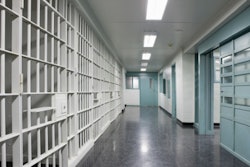Newsflash: Coronavirus is a thing—a real, actual thing.
Earlier this week, we reported that police in Ohio took the unusual step of boarding up the entrance to a bar that held a private event for regular customers despite a standing order in that state from Governor Mike DeWine to shut down operations amid the growing coronavirus outbreak.
Cincinnati police had previously warned the proprietor to remain closed under the governor's orders, but the bar held an event that attracted approximately 40 people.
Police shut down the establishment and charged the person responsible—who is not the owner—and officials are looking into revoking the bar's liquor license.
In New York City, the NYPD has told its officers they can ticket—and even arrest—restaurant or bar owners who flout the rules banning city nightlife and dine-in meals.
In Maryland, State Police Superintendent Woodrow Jones said the department will work to enforce the recent orders on mandatory "social distancing" and his officers are prepared to arrest business owners, customers and citizens who ignore the governor's instructions.
We reported this week that Philadelphia Police Commissioner Danielle Outlaw notified commanders that police will be delaying arrests for nonviolent crimes—including drug offenses, theft, and prostitution.
Other recent headlines on POLICE include:
- Police Week Candlelight Vigil Canceled Over Coronavirus
- Florida Police Enforcing COVID-19 Distancing Rules on Beaches
- Philadelphia Police Delaying Nonviolent Crime Arrests as Officer Safety Measure
- Kentucky Deputies Enforce Quarantine on Man who Refused to Self Isolate
There are many other news items related to Coronavirus—too many to list. Click here for our special coverage of the ongoing outbreak and the updated resources we've gathered for your safety and the safety of the citizens you serve.
Two weeks ago in this space I wrote that according to U.S. Department of Justice Office of Justice Programs, the diseases that should most concern law enforcement are those that are spread by casual contact between individuals. If a respiratory disease—such as influenza or measles—is spreading throughout the community, officers will be exposed repeatedly. As the incidence of a disease increases in the community, it also will increase among law enforcement officers, unless specific measures are taken to prevent infection.
Here are some additional thoughts in consideration of the most recent developments.
Staffing Issues
An increasing number of law enforcement officers—at least two dozen in Washington, another two dozen in California, and several more in other states—have been ordered into quarantine for suspected exposure to the virus.
An individual with symptoms of the virus—but who tests negative COVID-19—may return to work following resolution of immediately evident symptoms. However, many agencies are mandating that officers retuning to work be relegated to desk duty.
This exacerbates the burden on those officers who remain on the streets.
The practical implication is that many jurisdictions have had to address the prioritization of response to calls for service. Agencies across the country have announced that officers will only respond to high-priority calls for service. Some agencies have decided to take reports of non-violent crimes only via phone or online.
For example, the Denver Police Department announced late last week that they will implement a "modified report-taking process" to limit the amount of one-on-one interaction officers have with the public.
Some agencies have gone to different shift structures such as 12-hour "day" and "night" shifts as opposed to overlapping shifts ten hours in length.
Other agencies—especially those in rural areas not densely populated—have quickly set up overlapping jurisdictional agreements so that neighboring agencies can assist in response to crimes in progress.
Physical Health
Officers—and all other first responders—are now under significantly increased health risk due to the spread of COVID-19. These individuals are also now facing a substantial new mental health stressor.
Officers deal with "the unwashed masses" all day and every day. law enforcement officers—all first responders, hospital workers, and public service providers—can potentially be exposed to infectious diseases at almost any moment during their daily shift. Cops come into daily contact with countless individuals who are carriers of everything from hepatitis to tuberculosis to a variety of sexually transmitted diseases—and now, COVID-19.
Take appropriate precautions. The CDC—the lead agency identifying, studying, and recommending remediation for a host of health threats to American workers, including first responders—recommends the wearing of disposable gloves, eye protection, and face masks rated to N95 mask or higher.
And if you begin to feel any symptoms, do the responsible thing and stay at home. The most common symptoms of Coronavirus are fever, tiredness, and cough. Most people recover from the disease without needing special treatment but simply having it and walking around your city or town can exponentially worsen the problem.
Mental Health
With the nearly non-stop coverage of Coronavirus in the mainstream media, and a pretty steady stream of similar headlines here on POLICE, the impact on officers' mental health can potentially be harmful.
This should not be viewed as any manner of weakness. The fact of the matter is that these are stressful times—adding additional strain to an already difficult profession.
Just as you are being cautious with gloves and masks, be mindful of getting proper rest while off duty, seeking solace in your chosen faith, and watching out for your friends and fellow officers.
The possibility of becoming victim to PTSD during these days of uncertainty and widespread fear is a very real thing. Just as you would see a physician if you begin to show symptoms listed above that may indicate COVID-19, if you feel you have begun to suffer a mental or emotional injury, seek the assistance of an appropriately trained professional to help you fix what's wrong.
The "tough guy" days of dealing with emotional, mental, or spiritual injury are over. It's okay to not be okay, and it's more than okay to get treatment.
Final Words
Epidemiologists say it will take years to fully understand the mechanics of the Coronavirus outbreak, and how it differs from other pandemics throughout history.
For context, recall that a decade ago, the Swine Flu claimed the lives of approximately 200,000 people.
Bubonic Plague killed an estimated 200 million people in the 14th century.
The Smallpox outbreak in the 1500's killed an estimated 56 million.
HIV/AIDS has claimed the lives of as many as 35 million people in just three decades.
Hepatitis, tuberculosis, MRSA, West Nile Virus, and other infectious diseases remain as deadly today as always.
Modern medicine is rapidly evolving, and the entire world seems to be laser focused on solving this matter as quickly as possible.
Meanwhile, do your best to protect yourself and your community.
Stay safe out there.
















